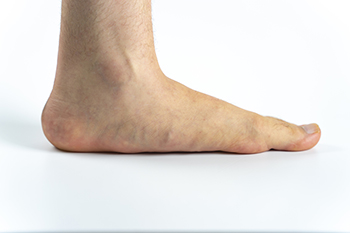
Flat feet, or fallen arches, occur when the natural arch in the foot is absent, leading to the entire sole making contact with the ground. While flat feet can be present from childhood, many people develop the condition later in life, known as adult-acquired flat feet. Causes include weakened or torn tendons, particularly the posterior tibial tendon, which supports the arch. Among other factors are arthritis, which can affect joint alignment, and injuries like bone fractures or ligament sprains that compromise foot structure. Obesity, diabetes, and even pregnancy can also increase the risk of developing flat feet by placing extra strain on the arches. Symptoms of adult flat feet often include foot, knee, or lower back pain, especially after extended standing or physical activity. Treatment from a podiatrist might involve custom orthotics, supportive footwear, or exercises to strengthen foot muscles. If you have flat feet that are problematic, it is suggested that you schedule an appointment with a podiatrist.
Flatfoot is a condition many people suffer from. If you have flat feet, contact one of our podiatrists from Houston Foot and Ankle Care. Our doctors will treat your foot and ankle needs.
What Are Flat Feet?
Flatfoot is a condition in which the arch of the foot is depressed and the sole of the foot is almost completely in contact with the ground. About 20-30% of the population generally has flat feet because their arches never formed during growth.
Conditions & Problems:
Having flat feet makes it difficult to run or walk because of the stress placed on the ankles.
Alignment – The general alignment of your legs can be disrupted, because the ankles move inward which can cause major discomfort.
Knees – If you have complications with your knees, flat feet can be a contributor to arthritis in that area.
Symptoms
- Pain around the heel or arch area
- Trouble standing on the tip toe
- Swelling around the inside of the ankle
- Flat look to one or both feet
- Having your shoes feel uneven when worn
Treatment
If you are experiencing pain and stress on the foot you may weaken the posterior tibial tendon, which runs around the inside of the ankle.
If you have any questions please feel free to contact our offices located in Inner Loop, Southwest, Greater Heights, and Pearland, TX . We offer the newest diagnostic and treatment technologies for all your foot and ankle needs.

